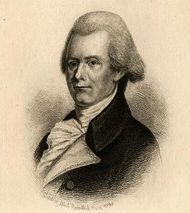| Founding Fathers | |
|---|---|

| |
| William Few | |
| State | Georgia |
| Religion | Episcopalian |
| Founding Documents | United States Constitution |
William Few (June 8, 1748 – October 9, 1824) was a lawyer and United States Senator from Georgia. He attended the Federal Constitutional Convention and signed the United States Constitution.
Early life
Few was born near Baltimore, Maryland, on June 8, 1748. His family moved to Orange County, North Carolina in 1758. With the exception of a brief period in the 1760s, Few was essentially self-educated. He found time to read and study law, and was admitted to the bar in 1776.,[1][2]
In 1788, Few married Catherine Nicholson who was the daughter of the well known Commodore James Nicholson.[3]
Military Service
Few was one of the first men to enlist in the volunteer militia company formed in Hillsborough. He later enlisted in the Richmond County Regiment, which his brother commanded. After the fall of Savannah to the British, Few's regiment led continued resistance, eventually forcing the British to abandon Augusta.[4]
Continental Congress
Following the war, Few won election to the Georgia Assembly, sat on the state's Executive Council, acted as state surveyor-general, and served as presiding judge of the Richmond County court. In 1780, he was appointed to represent Georgia in the Continental Congress. Though Few left Congress in 1782 to assist in rebuilding Georgia's government, he returned in 1786, and served through 1788.
While a member of that body, Few was asked by his state to serve concurrently in the Constitutional Convention that met in Philadelphia in 1787. This dual responsibility caused him to split his time between the two bodies and therefore to miss portions of the constitutional proceedings. Nevertheless, Few firmly supported the effort to create a strong national union and worked hard to secure the Continental Congress' approval of the new instrument of government. He also participated in the Georgia convention in 1788 that ratified the document.
Constitutional Convention
Few was asked to represent Georgia at the Federal Constitutional Convention in 1787. Due to his responsibilities as a member of the Continental Congress, he was unable to attend all of the sessions, but nonetheless played an important role. He also participated in the Georgia convention in 1788 that ratified the document. Other members of the Georgia delegation to the Convention were Abraham Baldwin, William Houstoun, and William Pierce.
Later Political Service
In 1789, Few was elected to the United States Senate as one of Georgia's original Senators, serving together with James Gunn. He served through 1793, and was appointed a judge of the circuit court of Georgia in 1794—a position he held until 1797.
In 1799, he moved to the state of New York, and served in the New York state assembly from 1802-1805.[5]
Later life
At the urging of his wife Catherine, they relocated to New York. Once there, he was director of Manhattan Bank from 1804 to 1814.[6]
Views on Slavery
Few was a staunch opponent of slavery. In a letter to Edward Telfair in 1804, he wrote: "every consideration of justice, humanity, and safety, forbids that any more Negroes should be brought into your state....... and in violation of law and every principle of policy and expediency they are carrying on that diabolical and injurious traffic, and hastening those evils in their nature most dreadful, which seems to demand every exertion to retard or prevent it."[7]
Death and Legacy
William Few died in Fishkill, New York on July 16, 1828. He was buried in Reformed Dutch Church Cemetery in Beacon, New York.
According to James Marshall, "He was one of those men, 'few and far between,' who effect more by solid weight of character than many can by eloquent speech or restless action".[8]
References
- ↑ http://bioguide.congress.gov/scripts/biodisplay.pl?index=F000100
- ↑ http://www.history.army.mil/books/RevWar/ss/few.htm
- ↑ Mary Telfair to Mary Few: Selected Letters, 1802-1844
- ↑ http://www.history.army.mil/books/RevWar/ss/few.htm
- ↑ Biographical Directory of the United States Congress, 1774-2005: The Continental Congress, September 5, 1774, to October 21, 1788, and the Congress of the United States, from the First Through the One Hundred Eighth Congresses, March 4, 1789, to January 3, 2005, Inclusive
- ↑ Shapers of the Great Debate at the Constitutional Convention of 1787: A Biographical Dictionary
- ↑ Slavery in the Early Republic
- ↑ The United States Manual of Biography and History: To which is Prefixed An Introductory History of the United States
| |||||||||||||||||||||||||||||||||||||||||||||||||||
